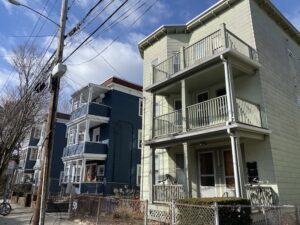Who is a member?
Our members are the local governments of Massachusetts and their elected and appointed leadership.

Somerville has revised its zoning to allow triple-deckers, a structural style that’s common in the city and elsewhere in Massachusetts.
In an effort to increase the inventory and types of housing available in the city, the Somerville City Council last November approved the legalization of triple-deckers, a structural style easily recognizable in the region and across the state.
“The reason we did this was to cover compliance with the MBTA Communities Act,” said City Councillor Matthew McLaughlin, who helped lead the effort. “It just seemed to be perfect timing.”
He said the zoning update “addresses two things: an appreciation for a historic building, and coming into compliance.”
“We are just allowing what is, to be,” he said. “You can now do what is already there.”
The triple-decker style — typically three units stacked on top of each other — became popular in the late 1800s and early 1900s for working class and immigrant families, as the structures allowed for the owner to live in one unit while renting the other two, or for multiple generations of one family to live in the same structure. But communities began to ban the buildings after the state enacted the Tenement House Act in 1912, which was tied to anti-immigrant movements of the early 20th century.
The city re-legalized the structures in 2019 as part of a zoning overhaul, but there were stipulations: new three-unit buildings could only be built next to an existing one, and one unit had to be affordable, even when a third unit was being added to an existing two-unit building.
McLaughlin called the 2019 ordinance “a compromise,” but added that it failed to result in new housing.
“It was too stringent of a restriction for anyone to do,” he said.
Last November’s update means that a three-unit building can be built as of right anywhere in the city — not just the traditional triple-deckers, but any building with three units.
“We’re facing an affordable housing crisis,” McLaughlin said. “Most of the people who grew up here don’t live here anymore. No one can afford it.
“One of the solutions we have is to change zoning and allow more housing to be built. I’m proud of what we have done, but it is interesting to see how difficult it can be.”
Somerville was one of 12 “rapid transit” communities that had until the end of 2023 to adopt zoning changes that would bring them into compliance with the MBTA Communities Act and encourage the development of multifamily housing near public transit.
Along with allowing triple-deckers, the city also passed amendments to repeal a rule that prohibited more than four people who are unrelated from living in the same house without a permit, and to remove a special permit process for all structures on steep slopes.